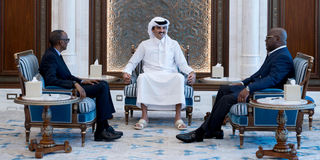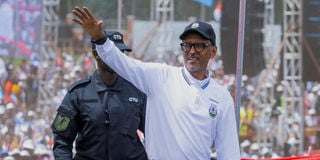DRC conflict: Inside Rwanda-Belgium fallout

Democratic Republic of Congo President Felix Tshisekedi and his Rwandan counterpart Paul Kagame meet with Qatar's Emir Sheikh Tamim bin Hamad Al Thani in Doha, Qatar, March 18, 2025.
Rwanda’s foreign affairs ministry suspended all diplomatic relations with Belgium in March 2025. Soon afterwards, Belgium expelled Rwandan diplomats. This came weeks after Belgium had suspended foreign aid to Rwanda. At the root of this diplomatic fallout is the resurgence of the rebel group, March 23 Movement (M23), which has made recent military gains in eastern Democratic Republic of Congo.
Prior to Rwanda suspending diplomatic relations, President Paul Kagame accused Belgium of continually undermining Rwanda. This deterioration in Rwanda-Belgium relations illustrates decades of the Kagame regime’s lack of trust in Brussels since the 1994 genocide. Jonathan Beloff, who has studied Rwanda’s political, security and foreign policies for nearly two decades, explains.

Rwandan president Paul Kagame during his political campaigns.
What is the historical relationship between Rwanda and Belgium?
Belgium is perhaps better known for having colonised the Congo. However, it also colonised present-day Rwanda and neighbouring Burundi.
Belgian forces conquered Rwanda, a former German colony, in 1916 during the first world war. They got help from nearby British forces in Uganda. The Treaty of Versailles, which brought an end to the world war, officially transferred Rwanda and Burundi to Belgium’s colonial holdings.
While Rwanda was never a significant interest for the Belgian colonial authorities compared to neighbouring Congo, Brussels nevertheless helped shape Rwandan politics, economy and society for decades.
Rwanda’s current government claims that ethnic divisions of Hutu, Tutsi and Twa only came to the foreground during Belgian colonial rule, which ended in 1962. Before German and Belgian colonisation, Rwandan officials described these communities as socio-economic groupings rather than ethnicities. It was only with the introduction of ethnic identification cards in 1933 that these groups became intractable ethnicities.
During much of its rule, Belgium used the existing political structures of kings, called Mwami, to carry out colonial policies.
While a majority of Tutsis and Hutus suffered under these policies, Belgian officials often blamed the Mwami and his courts. The Mwami was often a Tutsi based on the number of cattle he owned. This led to a growing anti-Tutsi sentiment within the majority Hutu population.
Eventually, it boiled over and led to the 1959 Hutu Revolution and the 1961 Coup of Gitarama. This anti-Tutsi sentiment established much of the political order following Rwandan independence in July 1962.
What key moments have shaped the relationship?
Prior to Rwandan independence, Belgium’s political allegiance shifted away from the mostly Tutsi Mwami and their power base to the growing Hutu movement. Under Rwanda’s Hutu leader and later first post-independence president Grégoire Kayibanda, Belgium began favouring Hutus. The community got increased education opportunities. Its leaders were given more say over post-colonial political events than the Mwami and his court.
Rwanda-Belgium relations focused on promoting the majority Hutu population, despite some discontent from conservative, mostly Tutsi, actors. With independence, Belgium played an important but diminishing role. It did not provide the financial support Kigali wanted. In response, Kigali turned to France, whose influence grew significantly under President Juvénal Habyarimana (1973-1994).
Despite their diminished state, relations between Rwanda and Belgium were still important. Belgium became the primary western nation to help provide stability in Rwanda during the waning years of the Rwandan Civil War (1990-1994), known locally as the Liberation War.
A peace deal in 1993, called the Arusha Accords, between the Rwandan Patriotic Front and the Habyarimana regime paved the way for a UN mission. However, getting western nations to send soldiers for the mission proved difficult. This was after a peacekeeping disaster in Somalia (the Battle of Mogadishu) earlier that year. As a result, Belgium ended up providing the bulk of troops for the Rwanda mission.
The assassination of Habyarimana on 6 April 1994 triggered the Genocide against the Tutsi. The UN mission’s commander sent a platoon to guard the home of prime minister Agathe Uwilingiyimana. The platoon had 10 Belgian and five Ghanaian soldiers. They were captured when Rwandan Presidential Guard officers stormed Uwilingiyimana’s home and killed her.
The Ghanaian soldiers were released relatively unharmed, while the Belgian soldiers were killed at the Camp Kigali military base. The murders were intended to provoke the UN mission’s withdrawal from Rwanda. Belgian troops departed within the genocide’s first week. This allowed Rwanda’s genocide to run uninterrupted for 100 days until the Rwandan Patriotic Front stopped it in July 1994.
Since the genocide, the ruling Rwandan Patriotic Front has had a sceptical view of Belgium. In 2000, former prime minister Guy Verhofstadt apologised for Belgium’s failure to stop the genocide and for fostering ethnic divisions during the colonial period.
Nevertheless, many Rwandan officials still believe Brussels hasn’t done enough to acknowledge its colonial record.
What’s behind the current fallout?
The current diplomatic crisis erupted because of accusations of Rwandan involvement in eastern DRC. UN experts’ reports have accused Rwanda of supporting the reanimated M23. The rebel group has captured large swathes of eastern DRC.
Belgium has been leading calls for European sanctions against Rwanda for this involvement. However, Rwanda – which denies supporting the M23 – claims that Belgium’s accusations are aimed at gaining favourable mining rights in the DRC.
Relations between the two countries have been deteriorating steadily in 2025. In February, Rwanda suspended a five-year (2024-2029) €95 million (US$102.8 million) deal. This was one of the largest aid deals between the two countries. In March, in addition to the suspension of diplomatic ties, the Rwanda Governance Board, which registers and monitors non-governmental organisations, placed restrictions on NGOs receiving financial support from Belgium.

Members of the M23 rebel group ride on a pickup truck as they leave their position for patrols amid conflict between them and the Armed Forces of the Democratic Republic of the Congo (FARDC), in Goma, eastern Democratic Republic of the Congo, January 29, 2025.
What’s the impact of this diplomatic falling out?
Rwanda-Belgium relations have never broken down to the current level.
It is unlikely to last in the long term. Like many other donor nations, Belgium needs Rwanda as a case study for proper aid utilisation and for its contribution to African peacekeeping.
Rwanda is Africa’s most active troop-contributing country to UN missions and the fourth most active worldwide. Its primary political, security and economic allies remain the United States and the United Kingdom. While relations with these two nations are strained, they’re not at the level reached with Belgium.
Nevertheless, the current state of affairs will continue in the near future unless the M23 is defeated. The only available avenues for quick restoration of relations are if Belgium apologises for seemingly siding with the DRC over Rwanda in the conflict in eastern Congo and repeats its apology for its colonial legacy. Neither of these options seems likely in the short term.
Jonathan Beloff is a Postdoctoral Research Associate, King's College London





